

Map me if you will. Image above: Greenwich Emotion Map by Christian Nold map me if you will: introduction In contrast to the conventional understanding of mapping the ‘map me if you will’ programme explores a broader meaning of mapping as a practice applied not only to space but also to the social body.
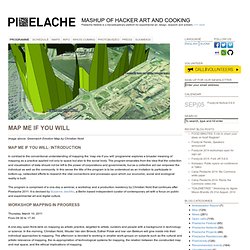
The program emanates from the idea that the collection and visualisation of data should not be left to the power of corporations and governments, but as a collective act can empower the individual as well as the community. In this sense the title of the program is to be understood as an invitation to participate in bottom-up, networked efforts to research the vital connections and processes upon which our economic, social and ecological reality is built.
The program is comprised of a one-day a seminar, a workshop and a production residency by Christian Nold that continues after Pixelache 2011. Workshop MAPPING IN PROGRESS Thursday, March 10, 2011 From 09.30 to 17.30. BudNews - Subjective Atlas of Hungary. Are you looking for a souvenir, which instead of being trivial is unique and a food for thought?
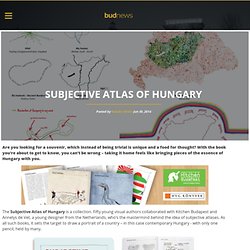
With the book you’re about to get to know, you can’t be wrong – taking it home feels like bringing pieces of the essence of Hungary with you. The Subjective Atlas of Hungary is a collection. Fifty young visual authors collaborated with Kitchen Budapest and Annelys de Vet, a young designer from the Netherlands, who’s the mastermind behind the idea of subjective atlases. As all such books, it sets the target to draw a portrait of a country – in this case contemporary Hungary - with only one pencil, held by many. photo:www.bureaudevet.be Making of the book was an interactive creative process – everyone brought his or her own ideas and stories, that were later edited, classified, mixed and reshuffled. The bilingual book is an unusual and very honest mirror of today’s Hungarian spirit.
Photo:subjectiveatlas.kibu.hu. „Aki fellapozza ezt a különös és kézenfekvő könyvet, az különös és kézenfekvő dolgokat tudhat meg Magyarországról.” (Parti Nagy Lajos) Is it possible to draw a portrait of contemporary Hungary with only one pencil, hold by many?
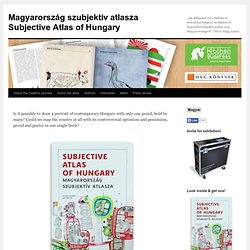
Could we map the country at all with its controversial optimism and pessimism, proud and poetry in one single book? Fifty young visual authors were invited by new media lab Kitchen Budapest and Dutch designer Annelys de Vet to put their homeland in perspective. Rather than folkloristic clichés, the authors present disarming personal visions based on involvement. Kitchen Budapest. Submap. Kitchen Budapest and UrbanCyclr teamed up to untangle the invisible pattern of bike traffic in Budapest. 100.000 kilometers of biking routes collected from individual bikers are overlaid on the city map.
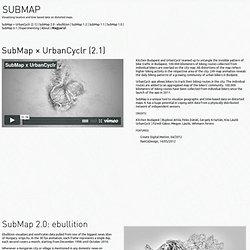
All distortions of the map reflect higher biking activity in the respective area of the city. 24h map animation reveals the daily biking patterns of a growing community of urban bikers in Budpest. UrbanCyclr app allows bikers to track their biking routes in the city. The individual routes are added to an aggregated map of the bikers' community. 100.000 kilometers of biking routes have been collected from individual bikers since the launch of the app in 2011. SubMap is a unique tool to visualize geographic and time-based data on distorted maps.
It has a huge potential in coping with data from a physically distributed network of independent sensors. Credits: Featured: Ebullition visualises and sonificates data pulled from one of the biggest news sites of Hungary, origo.hu. En immersion dans le Transform@t Lab – Transmedia Lab - Page 2. Après une semaine off où chacun des participants a pu méditer sur les découvertes de la première semaine à Newport, tout recommence à Budapest.
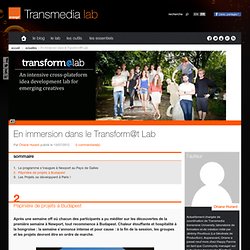
Chaleur étouffante et hospitalité à la hongroise : la semaine s’annonce intense et pour cause : à la fin de la session, les groupes et les projets devront être en ordre de marche. Dès le lundi matin, Zsòfia Ruttkay, directrice du Creative Technology Lab du MOME, l’université d’art et de design de Budapest, démarre la semaine en nous présentant les trois grands axes de recherche menés par son département : Book beyond print, Urban Games and Museum of the 21st century.
Parmi les projets présentés, on peut noter le projet de livre musical interactif Aunt Pepper, développé ici au MOME et auquel Manja Lekic, l’étudiante du MOME participant cette année au TFlab, a collaboré. Le livre est ici appréhendé comme un objet tactile, source de pédagogie ludique pour l’enfant.